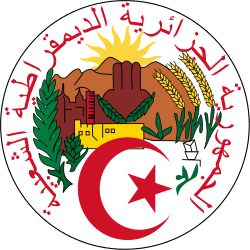Education in Algeria
| Ministry of National Education | |
|---|---|
| General details | |
| Primary languages | . |
| Literacy (2015) | |
| Total | 80% |
| Male | 87% |
| Female | 83% |

Education in Algeria is free and compulsory for Algerians from the ages of 6 to 16,[1] However, only half of Algerian students are enrolled in secondary schools.[2] As of 2015, Algeria has 92 post-secondary institutions, which includes 48 universities.[3]
History
During the colonization of Algeria, Napoleon III reestablished the usage of madrasa schools and created primary schools that were both Arabic and French.[4]
Languages
Students are primarily taught in Arabic, although teachers have been allowed to teach in Berber as of 2003. Berber teaching is allowed in Algerian schools to remove the complaints of Arabization and need for non-Algerian teachers.[2] Due to Algeria's French colonial past, French was the first foreign language taught in Algerian schools.[5] In 2004, language restrictions were enforced that made 90% of all teaching in Algerian schools in Arabic.[6]
Literacy
As of 2015, Algeria's literacy rate is estimated to be around 80%, higher than the literacy rates of Morocco and Egypt but lower than Libya's literacy rate. Of the 2015 literacy rate, 87% of Algerian males are literate, compared to 73% of Algerian females.[7]
Funding and Employment
Education makes up 15% of Algeria's national budget.[8] Algeria has one of the largest shortages of teachers in Northern Africa, with 200,000 primary teachers needed to help reach the United Nations's Sustainable Development Goal for education.[9]
Education by numbers
According to statistics by the UNESCO Institute for Statistics for the 2011–2012 academic year[10]
| Pupils | Census |
|---|---|
| Primary school | 3.452.000 |
| Lower secondary school | 3.240.000 |
| Upper Secondary school | 1.333.000 |
| Total | 8.023.000 |
References
- ↑ Singh, Kishore. "Report of the Special Rapporteur on the right to education". ohchr.org. Retrieved 19 October 2016.
- 1 2 Algeria country profile. Library of Congress Federal Research Division (May 2008). This article incorporates text from this source, which is in the public domain.
- ↑ Naylor, Phillip, C. (2015). Historical Dictionary of Algeria. p. 221. ISBN 0810879190. Retrieved 20 October 2016.
- ↑ Naylor, Phillip, C. (2015). Historical Dictionary of Algeria. p. 404. ISBN 0810879190. Retrieved 20 October 2016.
- ↑ "Learning English in Algeria through French-based background proficiency". Procedia - Social and Behavioral Sciences. 199: 496–500. August 2015. doi:10.1016/j.sbspro.2015.07.537. Retrieved 20 October 2016.

- ↑ The Report: Algeria 2014. Oxford Business Group. p. 217. ISBN 978-1-910068-20-5. Retrieved 20 October 2016.
- ↑ "The World Factbook". cia.gov. Retrieved 19 October 2016.
- ↑ "UNICEF Annual Report 2015 Algeria" (PDF). unicef.org. Retrieved 20 October 2016.
- ↑ "The world needs almost 69 million new teachers to reach the 2030 education goals" (PDF). uis.unesco.org. Retrieved 19 October 2016.
- ↑ "National Education Profile 2014 Update" (PDF). epdc.org. Retrieved 19 October 2016.
Further reading
- Aimeur, Roza. "Project-Based Learning in the Algerian Secondary School Syllabuses and Textbooks" (Archive; Degree of Magister in English). Mouloud Mammeri University of Tizi-Ouzou. 2010/2011.
